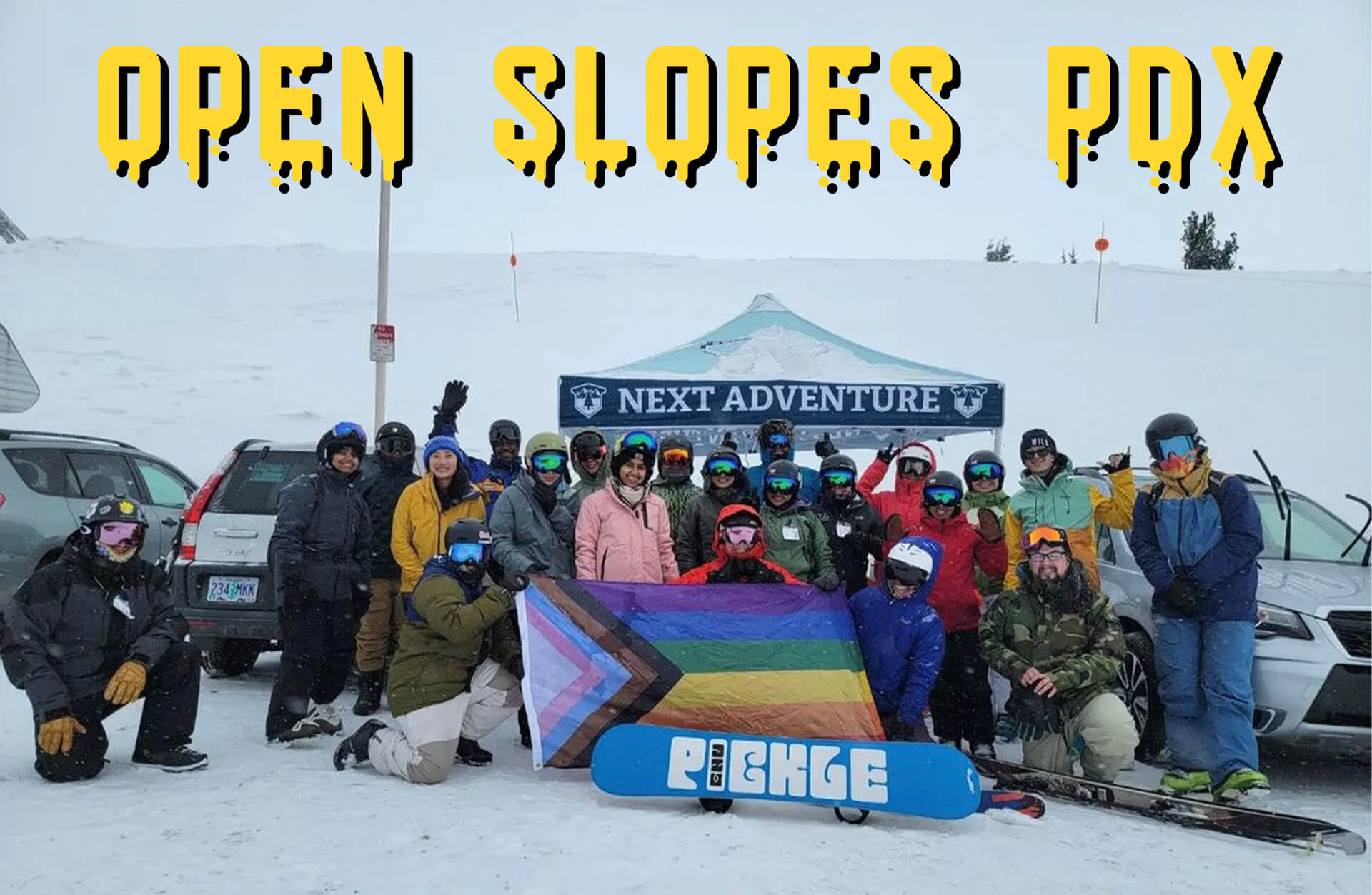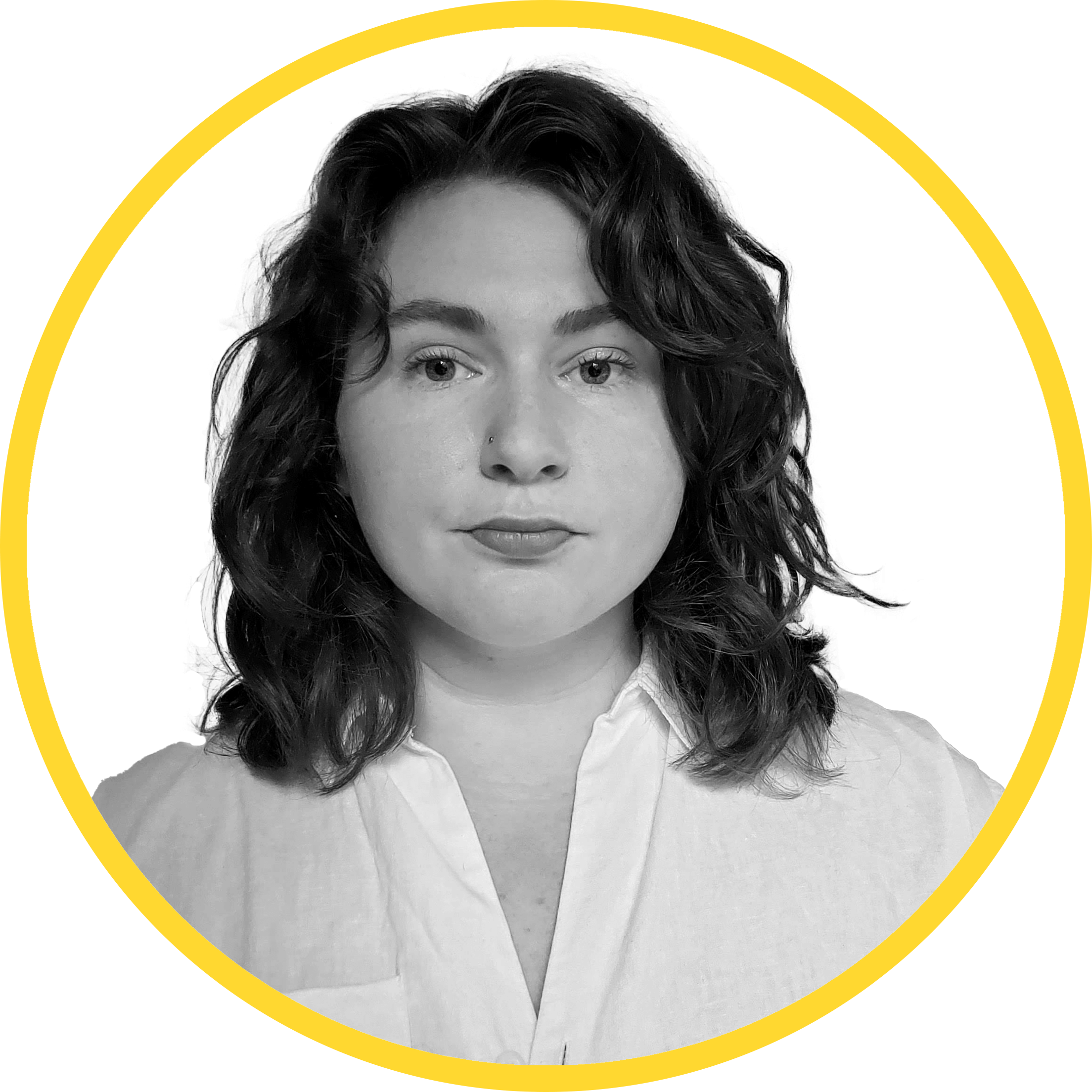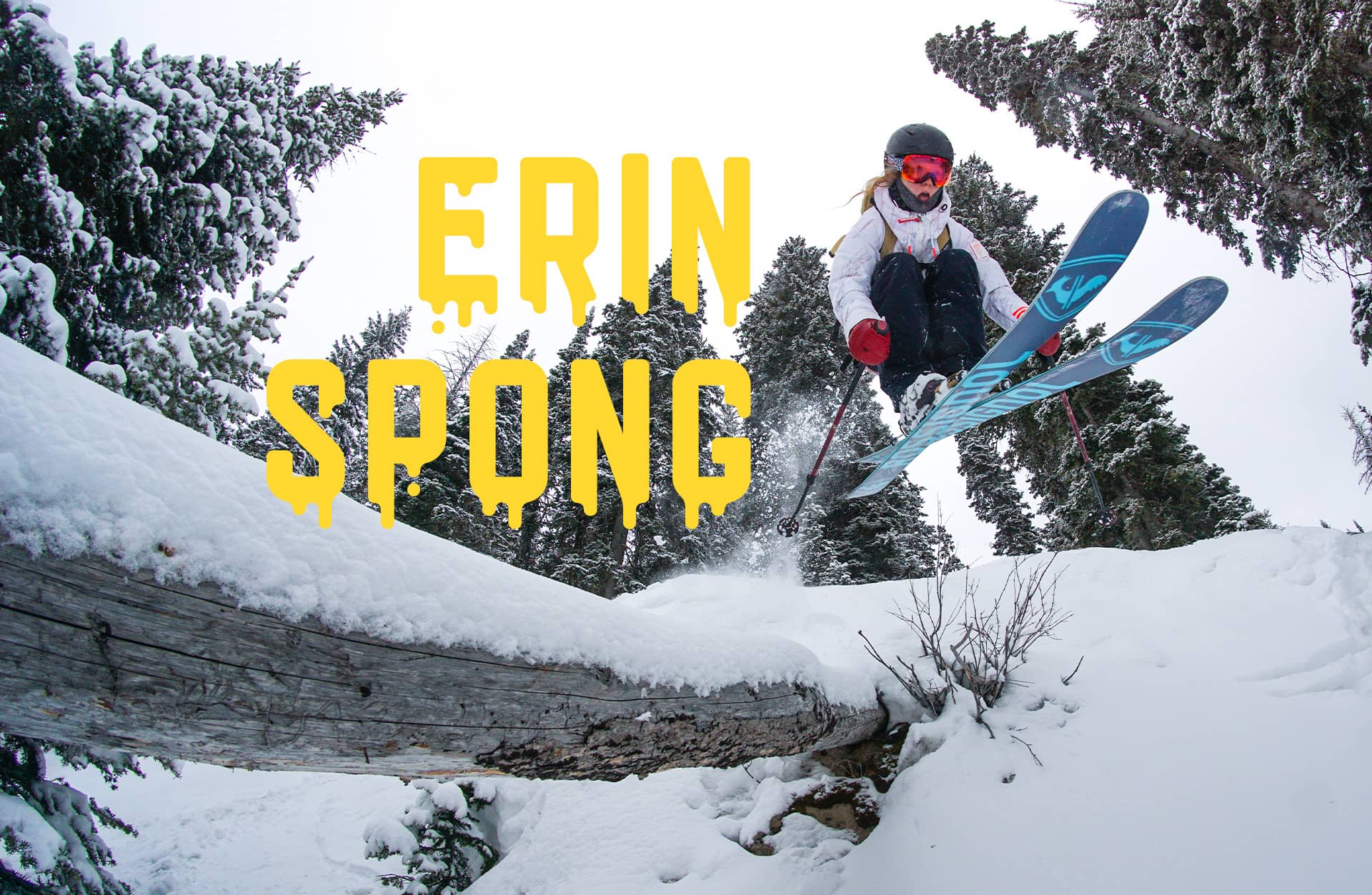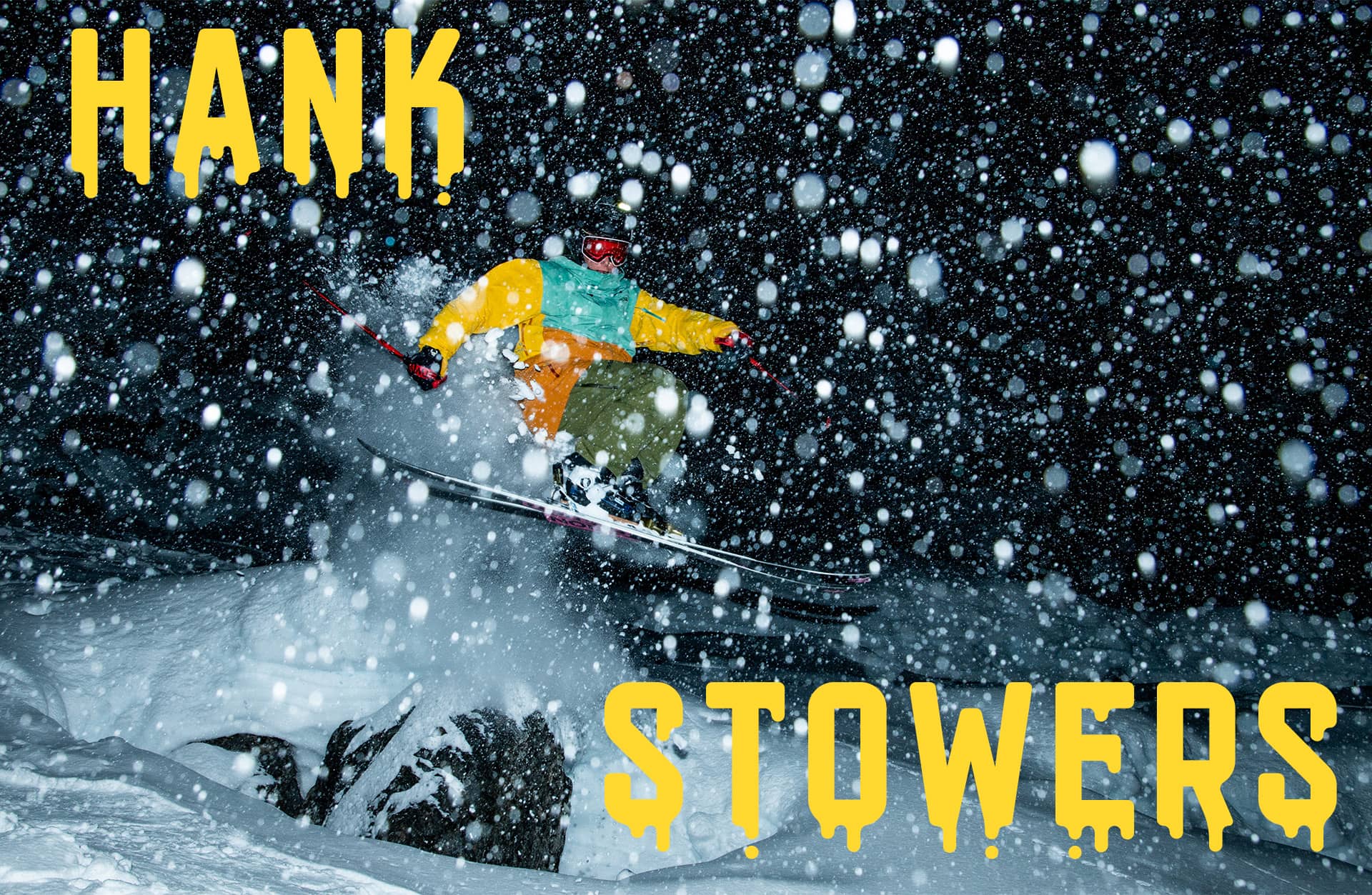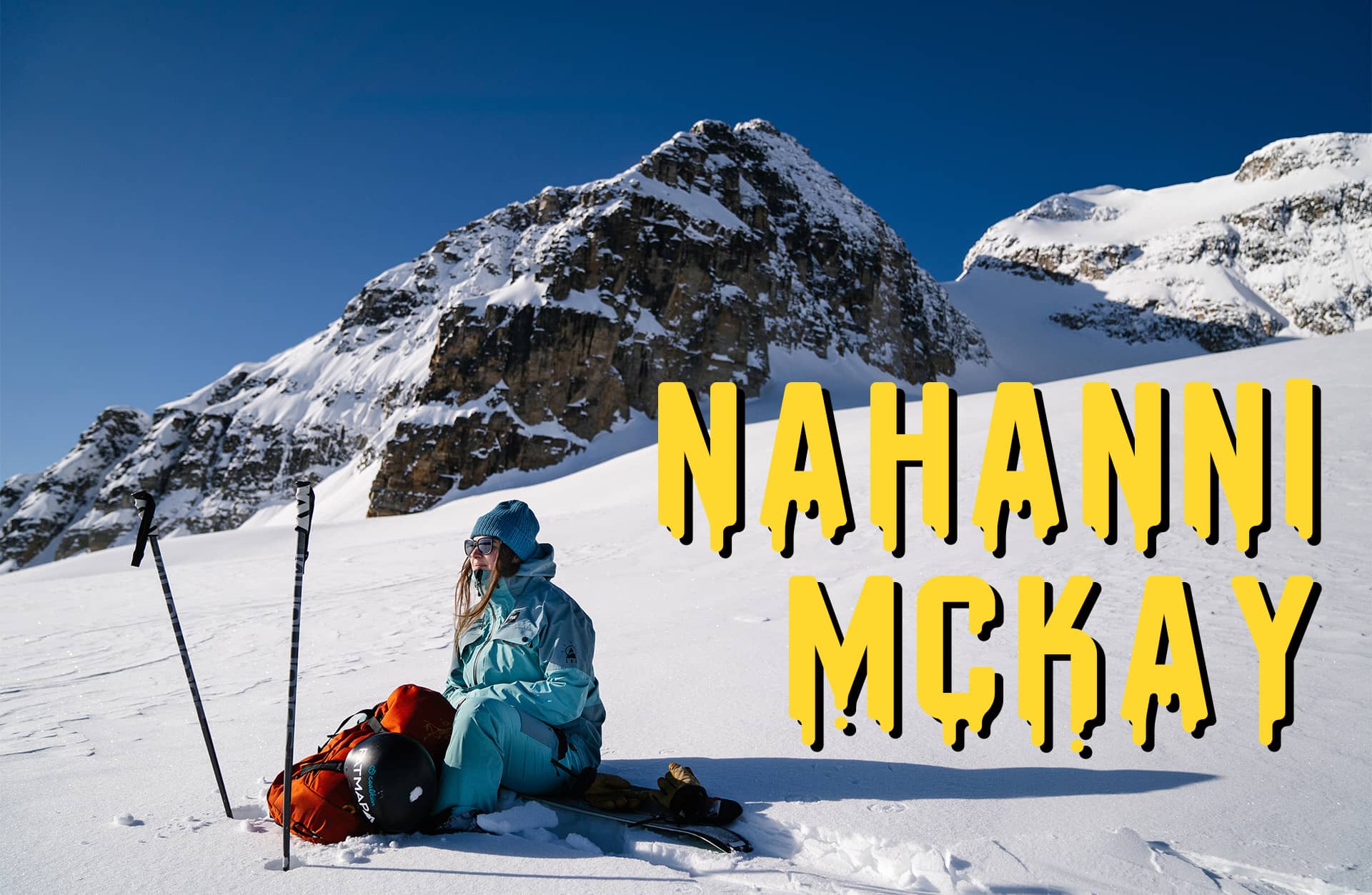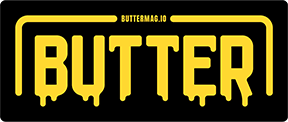SNOW // 01 SEP 2022
BREAKING DOWN BIPOC BARRIERS
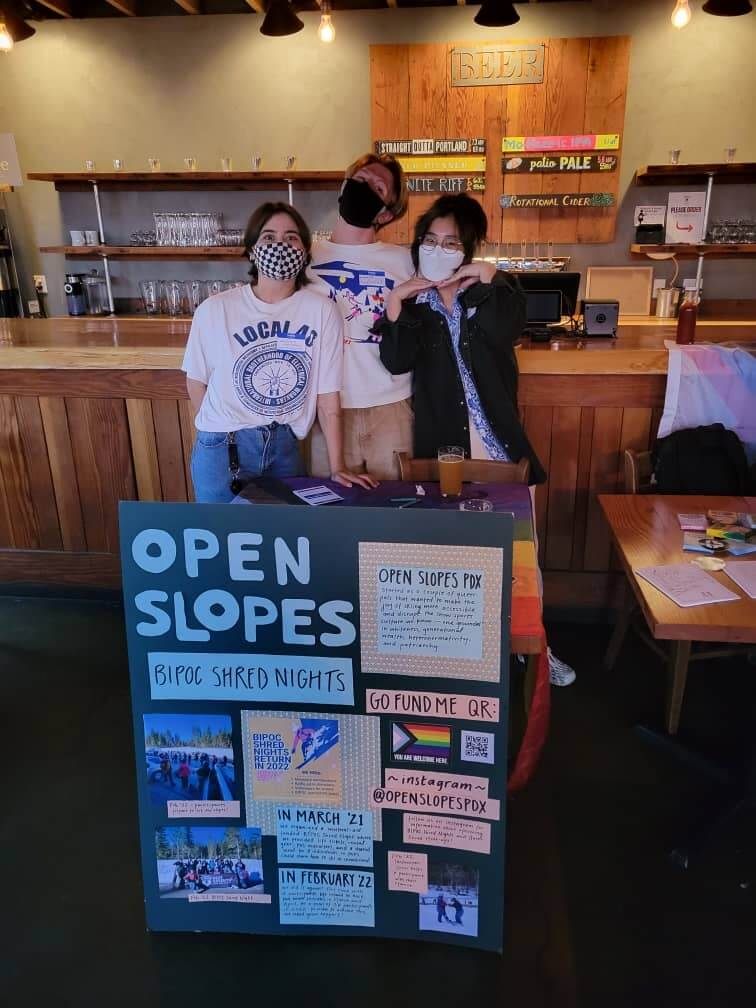
Carving through fresh powder, letting yourself fly off a jump, or even just playing in the snow as you race down a mountain, skiing and snowboarding unlock a freedom of self that is difficult to contextualize. “It made my body feel alive in a way that I think certain outdoor sports make you feel. I just felt really at home in my body,” said Open Slopes co-leader Mai Li O’Keefe, recalling their first time participating at an Open Slopes BIPOC Shred Night. Co-lead by Stowers, Dallas, and O’Keefe, Open Slopes is a community program that busts through the financial barriers to skiing and snowboarding to provide BIPOC folks interested in snowsports the opportunity to try.
Originally organized by Stowers and Dallas through their personal instagram accounts, O’Keefe attended the first BIPOC Shred Night in an effort to reconnect with the sport. “I didn’t grow up doing a lot of outdoor sports,” explained O’Keefe. “I grew up in the Midwest, and so skiing was never really on my mind. It was definitely categorized by my parents as one of the expensive sports that we didn’t participate in. But when I was 13 years old, I moved to Switzerland for three years because of my Dad’s job.”
Thrust into the wealthy environment of a private international middle school, O’Keefe was acutely aware of the economic gap between them and their fellow students. As a transracial adoptee , O’Keefe was not only one of the only people of color in their class, they were one of the only people of color period. “[There was] lots of cultural confusion and I just didn’t fit in for, obviously, a lot of reasons,” said O’Keefe.
As part of the gym curriculum at O’Keefe’s school, aligning perfectly with every Swiss stereotype, it was required that every student know how to ski. “You had to participate every year in a mandatory trip called Ski Week, which is exactly what it sounds like,” explained O’Keefe. “Where you go into the mountains and you just ski for four or five days straight with your classmates. You’re broken up into different groups based on ability because there’s obviously Swiss kids that have been skiing since they were out of the womb.”
While other students discussed their weekend trips up to their family ski chalets, O’Keefe was bullied over the size of their family’s rental home. As a transracial adoptee, O’Keefe faced the challenges of being a person of color in a white, privileged school alone. Skiing to O’Keefe became synonymous with that elitist, ostracizing culture. “I was like, if I don’t have to be in that space, I really don’t fucking want to be in that space,” they emphasized.
Upon moving back to the states, and eventually to Portland, OR, O’Keefe’s partner stumbled across the mutual aid-funded BIPOC Shred Night Then hosted by Dallas and Stowers, O’Keefe’s partner encouraged them to go, knowing they had always wanted to give the sport another try. “I didn’t really ski outside of those field trips [at school], even though I did enjoy it and it eventually clicked,” explained O’Keefe. “I skied a couple of times after I moved back to the US, but again, I couldn’t really afford it, nor was I willing to make it a priority.” After experiencing their first Open Slopes event they were hooked. Finally surrounded by a supportive community of other BIPOC individuals, O’Keefe was able to be fully present while skiing, and in turn, was able to have fun.
Invigorated by the event, O’Keefe applied for a scholarship through She Jumps, a non profit dedicated to increasing the participation of women and girls in the outdoors, to purchase their own gear. “I remember I literally burst into tears upon reading the ‘congratulations’,” smiled O’Keefe. “I think it’s really hard to engage in pleasure based hobbies sometimes. It was just really huge for me to be like, oh shit! I now have this gear that I can just go and play with. There doesn’t have to be any sort of alternate motive that’s driven by outward success.”
After receiving their scholarship, O’Keefe joined Dallas and Stowers in leading Open Slopes. “I’m not the best skier,” admitted O’Keefe. “I really don’t know that much about it, but I feel like I’ve really connected with people and that’s all I can really ask for in certain ways, you know what I mean? I’m not necessarily trying to be the best skier, but in centering my community over the actual sport itself, it’s made the sport so much more enjoyable.”
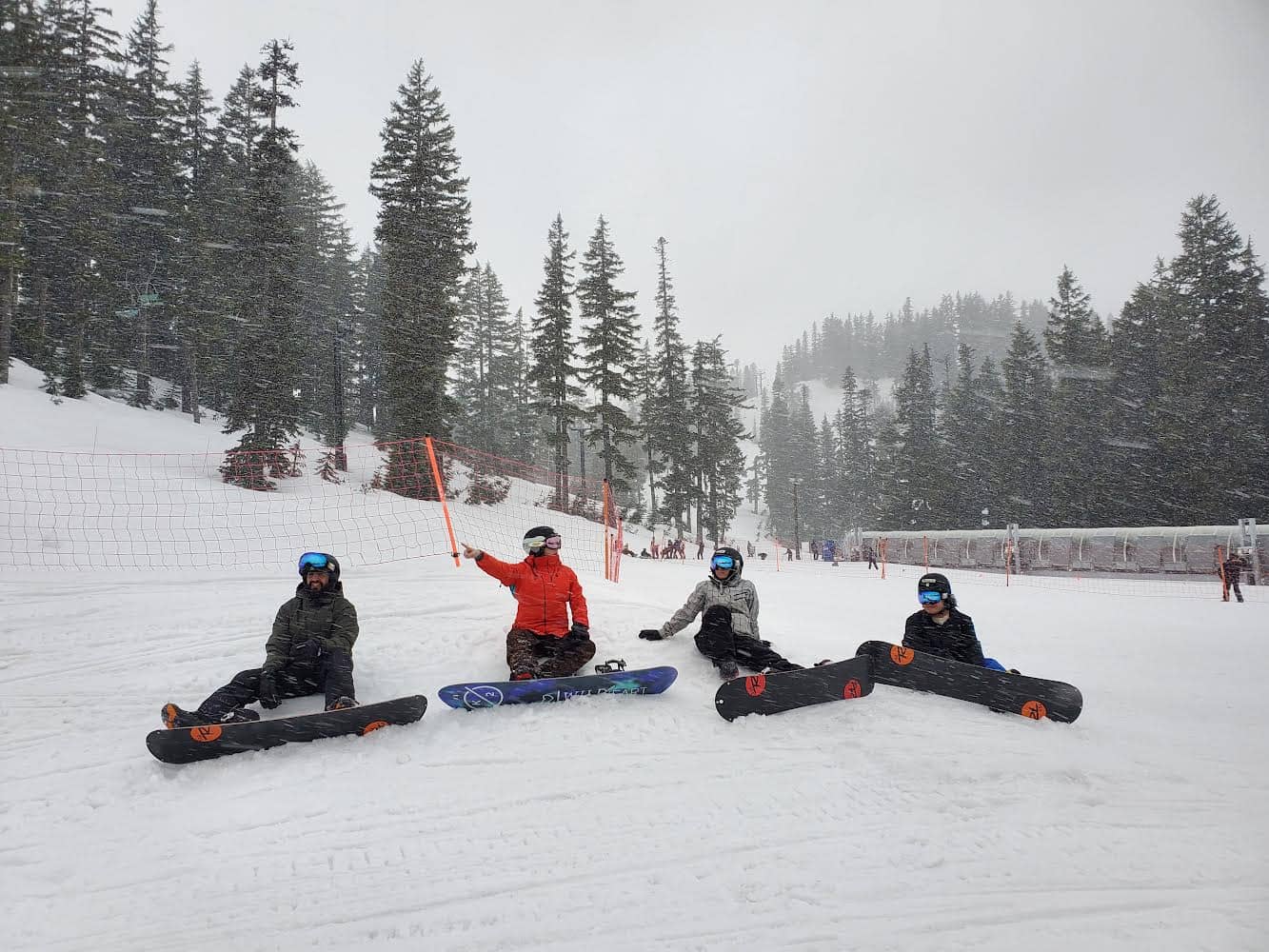
Running its first season of events in 2022, Open Slopes has already grown substantially, hosting several queer meetups and BIPOC events. The basis of Open Slopes is to eliminate as many barriers as possible for those interested in trying snowsports. “We provide the rental gear, we provide the lift tickets, we provide carpool transportation, we provide BIPOC mentors that we also compensate for their time and their skills, obviously,” explained O’Keefe.
With each resource provided by Open Slopes, the inaccessibility to snowsports shifts into focus. First, one needs a reliable source of transportation that is suitable for winter conditions. Second, gear. Not just skis or a snowboard, but boots, bindings, poles, a helmet, googles, warm enough underlayers, waterproof top layers, gloves, even just socks that don’t lead to cold toes. While not all explicitly necessary to ride up a lift and get down the mountain, any athlete will tell you how even on the best powder day they struggle to overcome the feeling of being wet and cold.
O’Keefe went on to explain the third. “I think too one of the biggin’s is the cultural inhibitors. Speaking from a person of color’s experience, there are very limited racial mirrors. I think that for me, growing up as a transracial adoptee, I didn’t have cool people that I saw myself in. That I could look up to and seek mentorship from or just have a point of aspiration that I could connect to in a way that was authentic to me. I feel like I had to assimilate and exist in whiteness to survive. Those are the things that I had to make concessions for to have people that I could look up to in certain ways.”
Mindful during every step of the process, the leaders of Open Slopes are always looking for feedback from their participants and treat every event as an opportunity to improve for the next. “We started out with rental gear, [which] Hank coordinated with Next Adventure [on for boots and skis]. Then we had between the three of us a hodgepodge box of [clothing],” explained O’Keefe. “But then we very quickly realized [that it] is not inherently size inclusive. We also want to give people the autonomy to choose what they’ll feel comfortable in. That translated to Hank working with Next Adventure to give everyone a $100 credit to Next Adventure. That way they could choose something that fit their body, that they felt comfortable and confident in.” A gear guide was also put together by Dallas and Hank to help participants determine which items were a necessity for winter recreation. It provided a helpful starting point since many of the attendees had never shopped for clothes meant for intense winter conditions before.
Gliding gracefully along every learning curve, Open Slopes stands as a testament of what a group of three skiers, passionate about creating change, can accomplish. “From January to April, it was just a constant sprint,” said O’Keefe reflecting on Open Slopes’ first season. “So I think in some ways, in hindsight, it probably was a little overwhelming, but I also think that I was so inherently motivated by what it was and the people I met that it didn’t really feel like a burden. I feel like I’ve smiled the hardest I’ve ever smiled in my entire life. There’s just, like, something so fucking cool about having 15 to 20, maybe more, BIPOC people hanging out right in front of a ski resort entrance just having fun. Taking up that space in a very obvious way.”
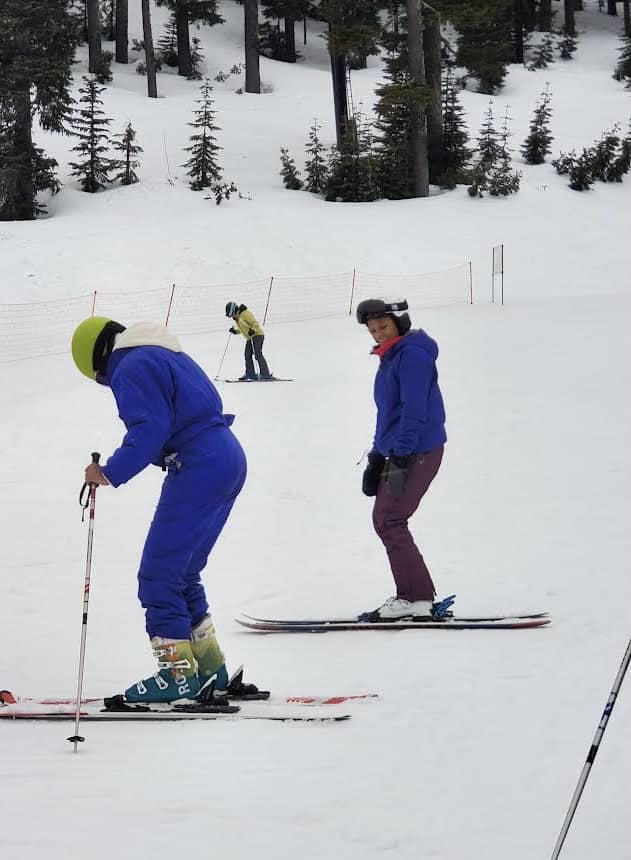
The last BIPOC Shred event of the season was held at Timberline resort, coinciding with a rail jam. Though the group hung out on a different part of the mountain doing their own thing, they were not about to miss out on a raffle for some gear, so O’Keefe purchased some tickets and gathered the group at a table to wait for their number to be called. It was O’Keefe’s favorite event of the season. “It was really funny because we had our little table of just brown people,” laughed O’Keefe. “It just felt really cool to exist in that space, not necessarily in a silo as our own thing, but to take up space as a group. Because no matter where we are, you inherently take up space by just being there. It was cool to have a fun time being loud and rowdy.”
Reintroduced to skiing by the right people at the right time, O’Keefe fell in love. But, that isn’t the case for every participant. Some people just don’t like skiing or snowboarding and that’s alright. What’s important to Open Slopes is giving folks in the BIPOC community the chance to find out. “I’ve heard so many people that don’t want to get into skiing or snowboarding because it is such a commitment,” explained O’Keefe. “[They] feel like [they] have to participate in a long term or more skill based way if [they’re] investing in [the sport] which takes some of the fun out of it. People should be able to try something and have the autonomy to be like, okay, I tried it, and I was able to try it in a way where I can walk away from it and I feel totally fine about it.”
Gathering the lessons learned, the trio has already begun ideating and planning for the Winter 22-23 Open Slopes season. In particular, O’Keefe hopes to bring in more intersectional events, potentially hosting Queer/Trans BIPOC meetups. Because, as O’Keefe stated, “No one really holds a single identity, right? It’s just not how people work.” Along with these intersectional events, the group is also looking to create more points of entry for beginners. Playing a bit of a numbers game, the trio is exploring the cost-benefit balance of taking skiers to more beginner local ski areas, where the cost of a lift ticket is nearly half the price of other resorts, but offers significantly less terrain.
“We’ve really been focusing on being critical of what we could be long term,” said O’Keefe, explaining how the group has been approaching their decision making process. “If it really does center around the people, there’s obviously balancing what we can feasibly manage as a group. But, I’m really proud of the way that we’ve kept the people aspect top of mind. The goal is never to become like a huge thing. The goal is to continue to foster these connections, increase access to an otherwise pretty terrible sports culture. That’s always what the goal is.”
